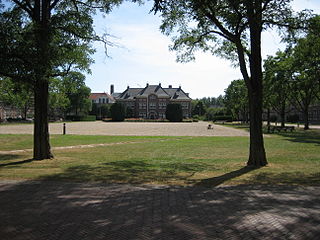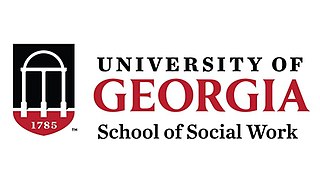Educational perennialism is a normative educational philosophy. Perennialists believe that one should teach the things that are of everlasting pertinence to all people everywhere, and that the emphasis should be on principles, not facts. Since people are human, one should teach first about humans, rather than machines or techniques, and about liberal, rather than vocational topics.

Liberal arts education is the traditional academic course in Western higher education. Liberal arts takes the term art in the sense of a learned skill rather than specifically the fine arts. Liberal arts education can refer to studies in a liberal arts degree course or to a university education more generally. Such a course of study contrasts with those that are principally vocational, professional, or technical, as well as religiously-based courses.

In education, a curriculum is broadly defined as the totality of student experiences that occur in the educational process. The term often refers specifically to a planned sequence of instruction, or to a view of the student's experiences in terms of the educator's or school's instructional goals. A curriculum may incorporate the planned interaction of pupils with instructional content, materials, resources, and processes for evaluating the attainment of educational objectives. Curricula are split into several categories: the explicit, the implicit, the excluded, and the extracurricular.

Trinity Western University (TWU) is a private Christian liberal arts university with campuses in both Langley and Richmond, British Columbia. The school is a member of Universities Canada.

University College Utrecht (UCU) provides English-language Liberal Arts and Sciences undergraduate education. Founded in 1998, as the first university college in the Netherlands, it is part of Utrecht University. Around 750 students of 70 different nationalities live and study on campus. Students can design their individual curriculum with courses in one of the three departments: Science, Social Sciences and Humanities.

The Louisiana Scholars' College at Northwestern State University, or "Scholars' College" as it is known by its students and faculty, is Louisiana's only designated four-year, selective-admissions honors college in the liberal arts and sciences.
Pre-medical is an educational track that undergraduate students in the United States pursue prior to becoming medical students. It involves activities that prepare a student for medical school, such as pre-med coursework, volunteer activities, clinical experience, research, and the application process. Some pre-med programs providing broad preparation are referred to as “pre-professional” and may simultaneously prepare students for entry into a variety of first professional degree or graduate school programs that require similar prerequisites.

University College Maastricht (UCM) is an English language, internationally oriented, liberal arts and sciences college housed in the 15th century Nieuwenhof monastery in Maastricht, Netherlands. Founded in 2002, it is the second of its kind in the Netherlands. The college is part of Maastricht University and offers a selective honours programme with a high workload. The Dutch Higher Education Guide ranked UCM the best bachelors programme in the Netherlands in 2015 and 2016; in 2012, 2014 and 2015 they ranked UCM the best university college in the Netherlands. In 2012, 2013, 2014, 2016 and 2018 Elsevier Magazine ranked UCM the best university college in the Netherlands in terms of student satisfaction.

William Theodore de Bary was an American Sinologist and scholar of East Asian philosophy who was a professor and administrator at Columbia University for nearly 70 years.
Regional Science High School Union (RSHS-Union) is a specialized system of public secondary schools in the Philippines, established during the academic year 1994-1995. It is operated and supervised by the Department of Education, with a curriculum heavily focusing on math and science. It remains within the ambit of the Department of Education, unlike the specialized science high school system of national scope, the Philippine Science High School.

The University of Georgia School of Social Work (SSW) is a college within the University of Georgia (UGA) in Athens, Georgia, United States.

Tyngsborough High School (THS) is located at 36 Norris Road in Tyngsborough, Middlesex County, Massachusetts, United States.
Columbia College is an independent not-for-profit two-year university transfer college located in Vancouver, British Columbia, Canada. The college is a registered charity and an incorporated Society composed of all Columbia College employees.
English studies is an academic discipline taught in primary, secondary, and post-secondary education in English-speaking countries; it is not to be confused with English taught as a foreign language, which is a distinct discipline. An expert on English studies can be called an Anglicist. The discipline involves the study and exploration of texts created in English literature. English studies include: the study of literature, the majority of which comes from Britain, the United States, and Ireland ; English composition, including writing essays, short stories, and poetry; English language arts, including the study of grammar, usage, and style; and English sociolinguistics, including discourse analysis of written and spoken texts in the English language, the history of the English language, English language learning and teaching, and the study of World of English. English linguistics is usually treated as a distinct discipline, taught in a department of linguistics.
Great Books programs in Canada are university/college programs inspired by the Great Books movement begun in the United States in the 1920s. The aim of such programs is to return to the Western Liberal Arts tradition in education. Those who mount such programs consider them to be corrective of what they perceive to be an extreme disciplinary specialisation common within the academy.
Caraga Regional Science High School is a public school in San Juan, Surigao City, Philippines. It is the leading school in the Division of Surigao City with high MPS during the annual National Achievement Tests (NAT), and has been consistent in making its name in Division, Regional, National and International level contests.

A classic is a book accepted as being exemplary or particularly noteworthy. What makes a book "classic" is a concern that has occurred to various authors ranging from Italo Calvino to Mark Twain and the related questions of "Why Read the Classics?" and "What Is a Classic?" have been essayed by authors from different genres and eras. The ability of a classic book to be reinterpreted, to seemingly be renewed in the interests of generations of readers succeeding its creation, is a theme that is seen in the writings of literary critics including Michael Dirda, Ezra Pound, and Sainte-Beuve. These books can be published as a collection or presented as a list, such as Harold Bloom's list of books that constitute the Western canon. Although the term is often associated with the Western canon, it can be applied to works of literature from all traditions, such as the Chinese classics or the Indian Vedas.

The College of General Studies(CGS) offers a two-year, general education core curriculum within Boston University. CGS is constructed in team system that limits the number of students in sections. The core curriculum is an interdisciplinary course of study taught by full-time Boston University faculty that all have attained PhD's. CGS freshmen are the second-largest incoming class of Boston University's ten undergraduate schools and colleges (next to the College of Arts and Sciences). All CGS freshmen are accepted as four-year bachelor's degree candidates, who, upon successful completion of the core curriculum and elective courses outside of CGS, continue to the Boston University's other nine undergraduate schools and colleges of their choice as long as the students meets the requirements of that college.
A high school diploma is a diploma awarded upon graduation of high school. A high school diploma is awarded after completion of courses of studies lasting four years, typically from grade 9 to grade 12. It is the school leaving qualification in the United States and Canada.
Stretton State College is an independent coeducational public school based in Stretton in Brisbane, Queensland, Australia. The college has a total enrolment of approximately 3070 students across the primary (Gowan) and secondary (Illaweena) campuses, located at 226 Illaweena Street, which is on the land on the adjacent side of Gowan Road from the Primary Campus.















